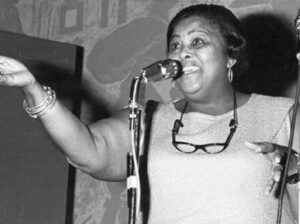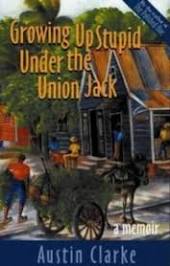|
Getting your Trinity Audio player ready...
|
Reading Time 7 mins
November 3, 2022
“European colonialization had at its rationalization, ‘The Bringing of the Light of Civilization’ to the backward natives. You cannot see the light if it is put in a place of brightness, so it was necessary that they create darkness so that their light would shine… but there was cultural resistance, and music was and continues to be a large part of that resistance.”
Earl Lovelace, Novelist, T&T Review, June 1998
“[T]he creative imagination must have a central place in social analysis.”
Brian Meeks, Narratives of Resistance: Jamaica, Trinidad, The Caribbean
 Listening to the sentiments of Caribbean governments and other royalists on the “Queen’s” passing, one cannot help but refashion Muhammed Ali’s statement: ‘Someone who views the world at 80 the same as s/he did at ten has wasted 70 years of life.’ Such slavish embrace of the violent and ‘ignoble’ past reached its zenith when a former “progressive” Prime Minister moaned the monarch’s passing as “a monumental loss” and celebrated her “total dedication to duty!” But to whom?
Listening to the sentiments of Caribbean governments and other royalists on the “Queen’s” passing, one cannot help but refashion Muhammed Ali’s statement: ‘Someone who views the world at 80 the same as s/he did at ten has wasted 70 years of life.’ Such slavish embrace of the violent and ‘ignoble’ past reached its zenith when a former “progressive” Prime Minister moaned the monarch’s passing as “a monumental loss” and celebrated her “total dedication to duty!” But to whom?
Little wonder Don Taffant, a community organizer in Brooklyn, quipped, “The Ex-PM’s alarm clock must have broken… allowing him to sleep three and a half times as long as Rip Van Winkle!” But, unlike Van Winkle, the high official awoke to an unchanged world.
It’s clear then that this former leader, like others of the ‘irresponsible elite,’ was ignoring not just the last 70 years but also the centuries of domination that contributed to the impoverishment of our region. Fortunately, many grassroots voices, as in the past, contest this suppression of our collective memory. Indeed, from the beginning of enslavement, the enslaved fought against the plunderers and their dehumanizing template of brutish colonialism.
This orientation is reflected in numerous battles of liberation by The Maroons in Jamaica, Bussa in Barbados, Fedon’s Insurrection in Grenada, and the earthshaking Haitian Revolution, among others which asserted and claimed the right to be born free, never surrendering to ‘unfreedom.’ Still, today, many aristocrats of knowledge–perhaps, in A. M. Clarke’s terms, “learning fools”–react as if suffering from cultural and historical amnesia. The colonial past, its neocolonial presence, and its futures hang like an
albatross on the necks of Caribbean people, yet too many remain asleep.

Bennett performing at the Anacostia Neighbourhood Museum’s Jamaica Festival in Washington, D.C., 1969. (Wikipedia)
As early as 1966, Louise Bennett envisioned Jamaica turning “history upside dung” and “colonizin Englan in reverse.” Yet, the governing elite still doesn’t grasp the futuristic challenge she may have been anticipating–a mode of “refashioning futures.” On the cultural plane, her native sound filters through the global airwaves. However, in light of the fawning adoration surrounding the Queen’s death, the vision of going beyond flag independence appears regressive. Such resistance to engaging and studying the wisdom of our indigenous scholars and poets underscores Lloyd Best’s assertion, “The Caribbean predicament is [that] the educated know little about country, culture or self.”
However, in his ageless classic, Black Stalin demonstrates that he knows much about history and self. In his anthem, “Bu’n Dem,” Black Stalin, an organic philosopher, tried and sentenced humanity’s villains to their just faith/fate–eternal flames. Dismissing “dat woman mary” in a classic line, Stalin explains:
“When we look at Bu’n Dem, the subject is people who have committed crimes against Africa and Africans at home and abroad…. In the song, all are stripped of their titles. So, I didn’t say Queen Victoria or Queen Mary… she became dat woman, mary. This was done to express outrage against all perpetrators of injustice against Africans.” (T&T Review, August 1988).
He continued, “These people don’t deserve the Mr. and Mrs. space with us.” Is it a stretch then to wonder if, in “Bu’n Dem” terms, one can’t dismiss the recently departed monarch as “dat woman elizabeth?”
II
Such is the nature of our Caribbean, which is still so encased in cant and pretense that leaders glaringly ignore the historical research–especially since the late 1950s–which has unearthed tomes of evidence that show the cruel and pervasive impact of colonization on the Caribbean and beyond. There’s no denying that the colonials and their enablers have been found guilty in the people’s court for sanctioning and underwriting barbarism, and worse, as their civilizing mission. So, to witness Afro-Saxon governments and their agents praise those who damned and pained us is an insult to good sense, the collective spirit, and critical reading of history.
Ironically 1953, the year dat woman elizabeth ascended to the British throne, coincided with Britain’s “Forbid[ding] Freedom” in British Guyana by removing its duly elected leader. Such imperial and paternalistic action, flowing from the impulse to dominate, profit from, and suppress authentic voices, prompted Cheddi Jagan, the deposed leader, to put The West On Trial. In the landmark book, Jagan asserted people’s sovereign and inherent right to make decisions. In a different vein, George Beckford reminds us that our “persistent poverty” flows from the colonial legacy of domination without remorse, or as Hilary McD. Beckles calls it “centuries of extractive colonial exploitation.”
In addition, the numerous reasoning sessions and ‘grounding with brothers and sisters’ opened eyes to the actual and pervasive aftershocks of Brutish and other colonizers’ plunder of Caribbean people, resources, land, and everything of va

lue. Walter Rodney’s How Europe Underdeveloped Africa, a revelatory book documenting the pillage of Africa by the European colonialists and their offspring, emphasized the salience of The Miseducation of The Negro. And in highlighting the colonial mindset, Norman Girvan underscored “[Alister] McIntyre’s notion of ‘functional’ dependence—the dependence that arises not from the constraints of size or structure but from the policies that West Indian governments pursue.”
Interestingly, the Ex-Prime Minister, one of the senior statesmen in the region, and someone who resigned from the Privy Council earlier in the year, nevertheless asserted that “Her [majesty’s] name will never be obliterated from the annals of human history.” Indeed, but with an imperfection. One wonders if, like the leaders who showered their devotion to the monarch by honoring her with as many as twelve days of mourning–more than observed in Englan— and proclamation upon proclamation, he was deaf to the Caribbean’s Cry and the ongoing debates since the time of enslavement about the barbarism of colonialism.
Still, too many of ‘our’ monarchists might embrace the tenor of “Big Party For Your Platinum Jubilee,” a celebratory calypso regaling the British Monarch with its declamation:
“The year of accession, 1952,
She took on this responsibility.
She has set the style for the longest while
Of just how elegant royalty can be.
Now the whole of the Commonwealth
Wants to drink Her Majesty’s health.”
However, there’s no more fitting remembrance/celebration than Barbados’ Cultural Ambassador, Dr. The Most Honorable Anthony Gabby Carter’s poem, “Good Riddance to Rubbish:“
This quiet
Wicked woman
Never lifted a hand
To help bring reparations
To any Caribbean land
Oh, what a bitter pill!
She never uttered a single word.
Against that Peta Botha
Whose Apartheid Regime
Unleashed its killer beam
On the Blacks of South Africa
She inherited millions of pounds
From the gains of slavery
Yet she allowed each colony
To wallow in poverty…
She made sure her colonies
Made no economic gain…
A few hours ago
We got the news…
That Lizzy
Queen of England died
At the age of ninety-six
I can’t offer no sympathy
I’ve never been a hypocrite…
Perhaps the governing elite in the region who still bow down to the monarchy may not have had 80 years of living but one year lived eighty times–as the venerable Keith Smith quipped in another context. Indeed, grassroots people are no hypocrites. They contested their governments’ official communique, which praised the queen’s reign. This prompted Oliver Samuels, a world citizen, and Caribbean man, to say–perhaps, a bit tongue in cheek–that he’s “not a political creature.” Still, he expressed bewilderment at the outpouring of condolences and excessive mourning.
Similarly, in a youtube clip, a Sister appeared baffled when notified of the queen’s passing, indicating that the only Queens she knew were Caribbean Divas who spread true love and displayed comity to the Caribbean masses. Her skit prompted a colleague to exclaim: “That’s the Essence of Republicanism!” However, this disposition is in stark contrast to Sir Ellis Clarke. On becoming Trinidad and Tobago’s first president, he stopped using “Sir” but resurrected it once he was no longer president!
The acceptance of such honorific titles by our titans was not lost on the Mighty Chalkdust, who in 1976 wondered why someone who is a king in his right and area of expertise would “kneel down in front the queen and be a knight.” This situation, which borders on absurd, makes one wonder why, even today, the elite fawned over the queen’s 70-year rule and clings so desperately to the titles she dished out, often valuing them above their national awards/titles.
Little wonder that Gabby is unapologetic in insisting that reckoning time is now. Escaping the thin and seductive guile of the colonial mindset, Gabby stands upright and writes with a clear understanding of history, despite the snarls of the enemies of progress and their resistance to critical and unclouded thinking.
Still, one can’t help but wonder how P.J. Patterson, Jamaica’s Deputy PM and Minister of Foreign Affairs in 1979, reacted on hearing Peter Tosh’s 1979 battle cry summoning the masses to:
Light your chalice
We gonna burn it inna Buckingham Palace
Lend me a paper
Lend me a fire
Light up your spliff
I say, light your chalice
We gonna burn it inna Buckingham Palace
Lend me a paper
Lend me some fire
Make we chase ‘way vampire…
This is a true emancipation
Come to set the people free, yeah, mhm hm.
It’s even more evident today why we must embrace emancipation from mental slavery and shed the burden of “Growing Up Stupid Under the Union Jack,” as A. M. Clarke compels.
Today many ordinary Britishers see the monarchy as the standard bearer of the fading parasitic oligarchy. Caribbean leaders and royalist enablers must check their history and reconsider policies and pronouncements that honor those who dishonor us. Such rethinking is imperative so that they don’t merely replicate their idol’s image and perpetuate the absurdity of governance in the Caribbean as dat woman elizabeth did throughout her reign.
Now is the time to interrogate history, thus freeing ourselves of the burden of monarchy and its baggage as we refashion our space into an equity-based one. So let’s “Ring De Bell” and join Jimmy Cliff in affirming:
“I’d rather be a free man in my grave,
Than living as a puppet or a slave.”
- This is an extended version of an article published in Everybody’s, October/November 2022.
Big Drum Nation introduction to the “London Bridge is Falling Down” series
Winthrop R. Holder, a founding member of the Caribbean Awareness Committee, NY, is co-editor of BIG DRUM NATION.

